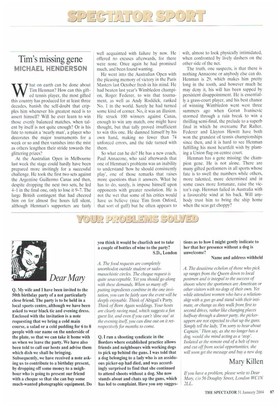Tim's missing gene
MICHAEL HENDERSON
What on earth can be done about Tim Henman? How can this gifted tennis player, the most gifted this country has produced for at least three decades, banish the self-doubt that cripples him whenever his greatest need is to assert himself? Will he ever learn to win those evenly balanced matches, when talent by itself is not quite enough? Or is his fate to remain a 'nearly man', a player who decorates the major tournaments for a week or so and then vanishes into the mist as others lengthen their stride towards the glittering prizes?
At the Australian Open in Melbourne last week the stage could hardly have been prepared more invitingly for a successful challenge. He took the first two sets against the Argentine Guillermo Canas and then, despite dropping the next two sets, he led 4-1 in the final one, only to lose it 9-7. The large British contingent that had cheered him on for almost five hours fell silent, although Henman's supporters are fairly well acquainted with failure by now. He offered no excuses afterwards, for there were none. Once again he had promised much, and been found wanting.
He went into the Australian Open with the pleasing memory of victory in the Paris Masters last October fresh in his mind. He had beaten last year's Wimbledon champion, Roger Federer, to win that tournament, as well as Andy Roddick, ranked No. 1 in the world. Surely he had turned some kind of corner. No, it was an illusion. He struck 100 winners against Canas, enough to win any match, one might have thought, but that tally proved insufficient to win this one. He damned himself by his own hand, making no fewer than 74 unforced errors, and the tide turned with them.
So what can he do? He has a new coach, Paul Annacone, who said afterwards that one of Henman's problems was an inability to understand 'how he should consistently play', one of those remarks that raises more questions than it answers. What he has to do, surely, is impose himself upon opponents with greater resolution. He is not the wet that some of his critics would have us believe (nice Tim from Oxford, that sort of guff) but he often appears to wilt, almost to look physically intimidated, when confronted by lively dashers on the other side of the net.
The truth, one suspects, is that there is nothing Annacone or anybody else can do. Henman is 29, which makes him pretty long in the tooth, and however much he may deny it, his will has been sapped by persistent disappointment. He is essentially a grass-court player, and his best chance of winning Wimbledon went west three summers ago when Goran Ivanisevic stormed through a rain break to win a thrilling semi-final, the prelude to a superb final in which he overcame Pat Rafter. Federer and Lleyton Hewitt have both won the grandest of tennis championships since then, and it is hard to see Henman fulfilling his most heartfelt wish by planting a Union flag on centre court.
Henman has a gene missing: the champion gene. He is not alone. There are many gifted performers in all sports whose fate is to swell the numbers while others, more talented, more determined and in some cases more fortunate, raise the victor's cup. Henman failed in Australia with a favourable wind at his back. Will anybody trust him to bring the ship home when the seas get choppy?




























































































 Previous page
Previous page